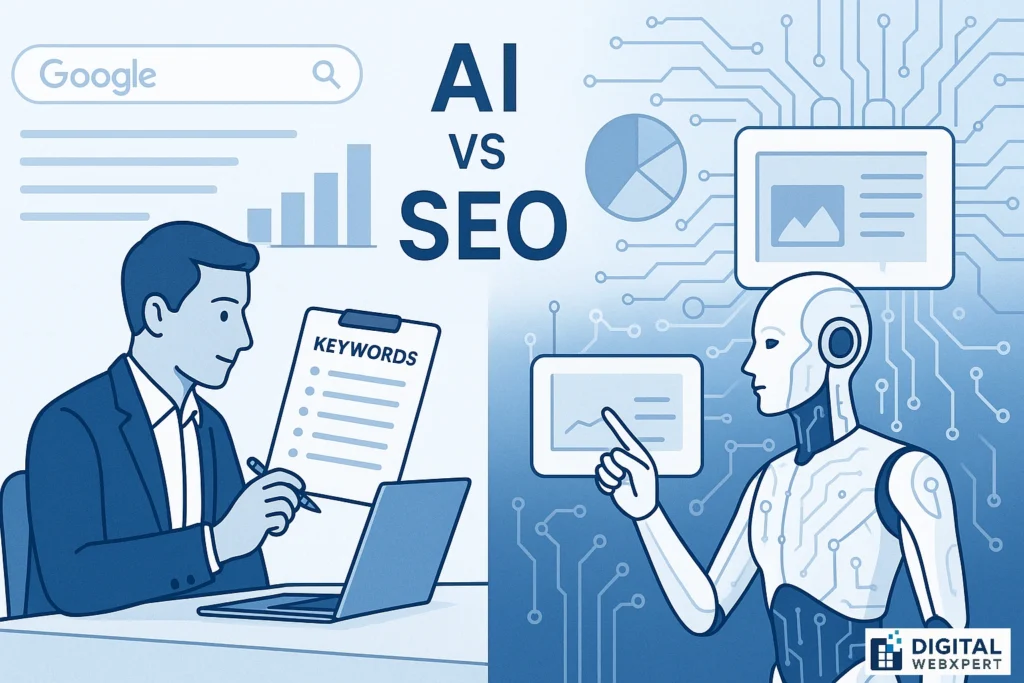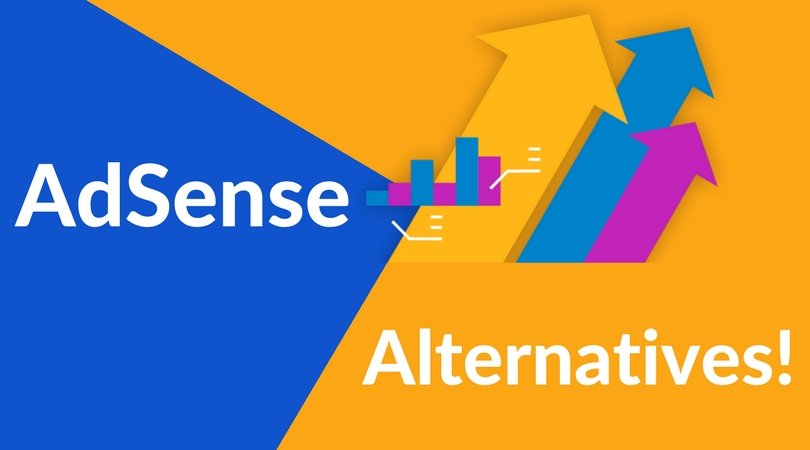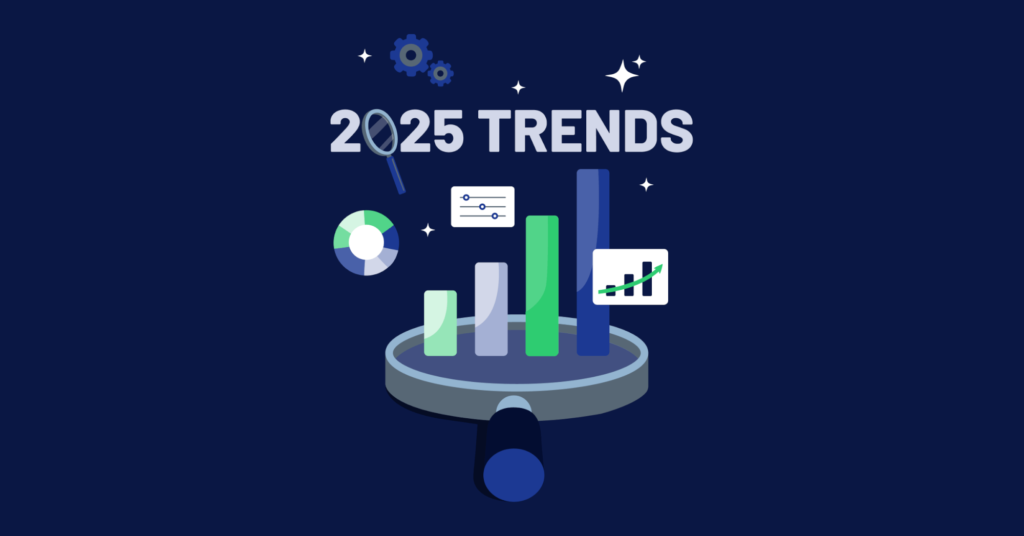Introduction: AI SEO vs Traditional SEO — The 2025 Showdown
AI SEO vs Traditional SEO is one of the hottest debates shaping the future of digital marketing in 2025. As Google’s algorithms evolve with artificial intelligence and user intent becomes the top priority, traditional methods alone are no longer enough.
According to Gartner’s Digital Trends Report 2025, businesses using AI-driven SEO strategies grow 2.3x faster than those relying on manual optimization.
At Digital WebXpert, we’ve seen this transformation firsthand — AI-powered optimization now leads the charge in driving traffic, conversions, and ROI.
1. AI SEO vs Traditional SEO: What’s the Core Difference?
AI SEO (Artificial Intelligence Search Engine Optimization) integrates machine learning, natural language processing (NLP), and predictive analytics to make data-driven SEO decisions automatically.
Meanwhile, Traditional SEO relies on manual keyword research, human analysis, and manual adjustments to optimize rankings. It works, but it’s slow and reactive compared to AI’s real-time intelligence.
Example:
A retailer using AI SEO can analyze thousands of keywords and optimize hundreds of pages in minutes — something that might take a human team weeks.
2. Smarter Keyword Targeting with Machine Learning
Traditional SEO depends on manual research tools, while AI SEO leverages predictive modeling to forecast which keywords will perform best before they trend.
AI platforms like Surfer SEO and Semrush identify hidden long-tail opportunities based on user behavior and search intent.
At Digital WebXpert, we use machine learning algorithms to pinpoint keyword clusters that improve visibility across multiple related searches — increasing organic reach by over 40%.
3. Content Optimization: Manual Effort vs AI Precision
In Traditional SEO, writers manually insert keywords and optimize content structure. AI SEO, however, uses NLP to analyze readability, sentiment, and search intent, producing content that’s naturally aligned with Google’s Helpful Content Update.
AI SEO tools evaluate tone, structure, and user engagement metrics in real-time — ensuring that your articles aren’t just keyword-rich, but genuinely helpful and conversion-focused.
💡 Fact: Businesses using NLP-powered SEO content tools see up to 50% higher on-page engagement (Source: Forbes Tech Council).
4. Technical SEO: Automation Takes the Lead
Traditional technical SEO relies on manual audits to fix site errors, manage Core Web Vitals, and optimize schema markup.
AI SEO automates all of this. AI crawlers at Digital WebXpert continuously monitor your site for errors, improving site speed, fixing metadata, and optimizing structure automatically.
Benefits of AI-Driven Technical SEO:
- 24/7 automated site audits
- Predictive maintenance before rankings drop
- Core Web Vitals optimization
- Voice and visual search readiness
5. Link Building: Smart Outreach with AI
Traditional link building is time-consuming — it involves manual outreach and relationship building.
With AI SEO, link building becomes smarter. AI systems evaluate link quality, topical relevance, and anchor diversity before recommending opportunities.
At Digital WebXpert, our AI link intelligence tools find high-authority domains that improve rankings without risk of spammy backlinks.
6. Real-Time Optimization: Reactive vs Predictive SEO
Traditional SEO waits for algorithm updates and reacts afterward. AI SEO, on the other hand, predicts changes before they happen.
Predictive analytics tools analyze Google’s data patterns and user signals, alerting SEO teams ahead of shifts. This proactive advantage means businesses stay stable even when algorithms update.
📈 Result: Brands using predictive SEO maintain 90%+ keyword stability across updates (Statista, 2025).
7. ROI & Performance Tracking: Manual vs Smart Analytics
In Traditional SEO, analytics are manual, slow, and scattered across tools.
AI SEO consolidates everything into a single dashboard — offering insights into traffic, conversions, and ROI instantly.
Digital WebXpert’s AI SEO platform includes:
- Real-time keyword tracking
- Predictive ranking forecasts
- Competitor activity alerts
- ROI heatmaps
This level of automation enables data-backed decisions that improve performance continuously.
AI SEO vs Traditional SEO: Quick Comparison
| Feature | Traditional SEO | AI SEO (2025) |
|---|---|---|
| Keyword Research | Manual | Predictive & Automated |
| Content Optimization | Manual | AI & NLP Powered |
| Technical SEO | Periodic Audits | 24/7 Automation |
| Link Building | Manual Outreach | AI Link Intelligence |
| Analytics | Reactive | Real-Time |
| Adaptability | Slow | Instant |
| ROI Tracking | Manual | Predictive Dashboards |
Challenges of Both Approaches
While Traditional SEO is reliable, it’s slow. AI SEO is faster but requires data and tool integration.
| Challenge | Traditional SEO | AI SEO |
|---|---|---|
| Time | Labor-intensive | Automated |
| Cost | Lower upfront | Investment in AI tools |
| Skill | Basic SEO | Requires AI understanding |
| Data | Limited insights | Relies on clean data |
At Digital WebXpert, we blend both — using AI for precision and human strategy for creativity.
Case Study: 180% Organic Traffic Growth with AI SEO
A mid-sized eCommerce brand approached Digital WebXpert with declining traffic.
Using AI SEO automation, NLP-driven content, and predictive keyword targeting, we achieved:
- +180% organic traffic
- +37% sales conversion
- 4x content output efficiency
You can explore this transformation in our Case Studies section.
Future of SEO: What’s Next After 2025?
The next era of SEO focuses on:
- Voice and visual search optimization
- Personalized AI-generated SERPs
- Conversational search
- Predictive ranking algorithms
Businesses embracing AI SEO today are already future-proofing their visibility for tomorrow’s digital landscape.
Conclusion: The Verdict — AI SEO Wins in 2025
The AI SEO vs Traditional SEO debate is over — AI SEO dominates 2025 with data-driven precision, real-time analytics, and unmatched scalability.
Traditional SEO still provides a strong foundation, but AI SEO ensures faster growth, smarter insights, and higher ROI.
👉 Ready to power up your rankings?
Contact Digital WebXpert today for a Free AI SEO Consultation and start building your future-ready SEO strategy.
FAQs
Q1. What is AI SEO?
AI SEO uses artificial intelligence to automate keyword research, content optimization, and SEO reporting for faster results.
Q2. Is Traditional SEO still relevant in 2025?
Yes — but combining it with AI SEO ensures stronger rankings and better adaptability.
Q3. How long does AI SEO take to show results?
You’ll start seeing performance improvements within 60–90 days.
Q4. Can small businesses use AI SEO?
Absolutely. Digital WebXpert offers affordable packages tailored to startups and SMEs.
Q5. What makes AI SEO more effective?
AI SEO provides predictive insights, real-time optimization, and automates complex tasks, reducing human error while improving ROI.



